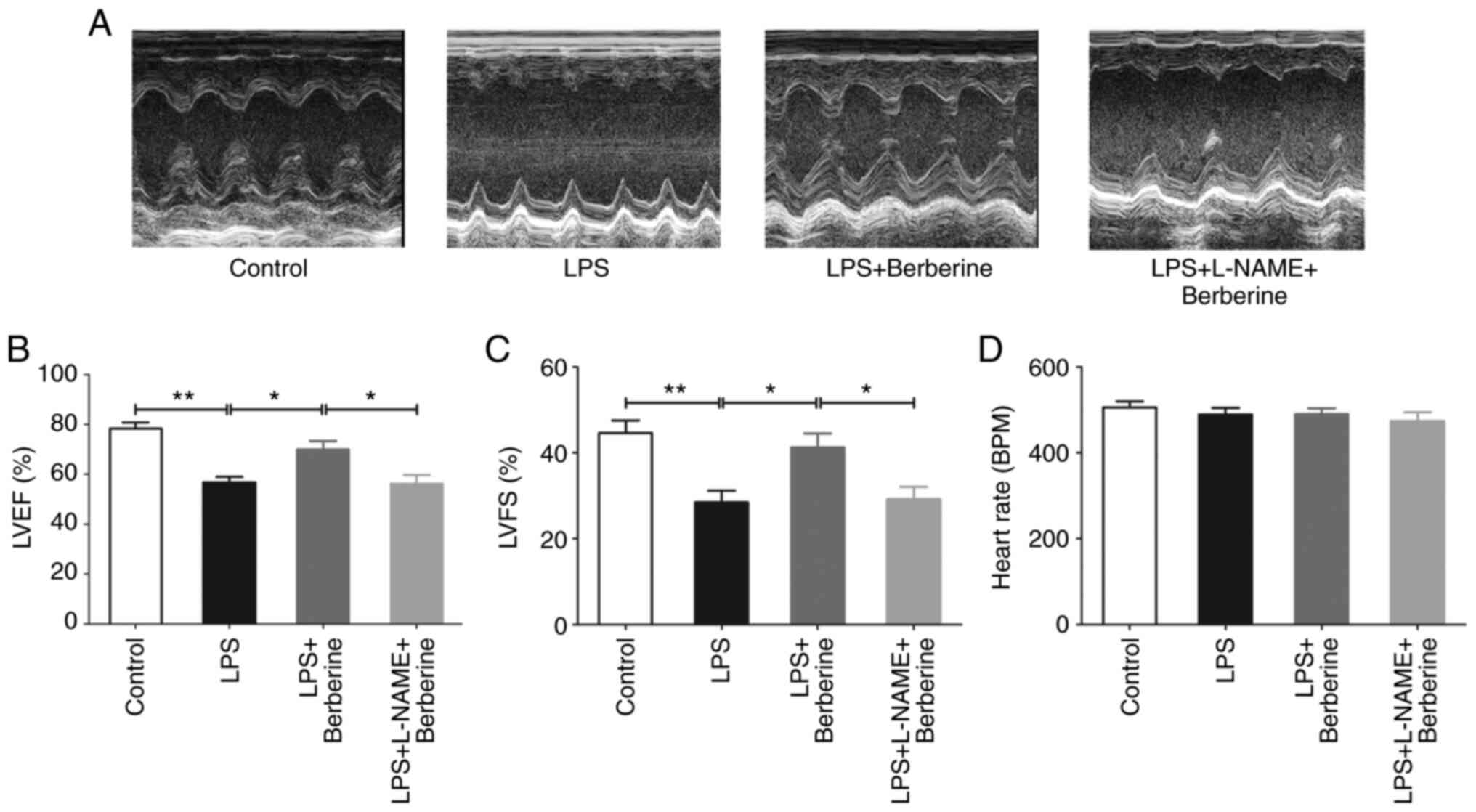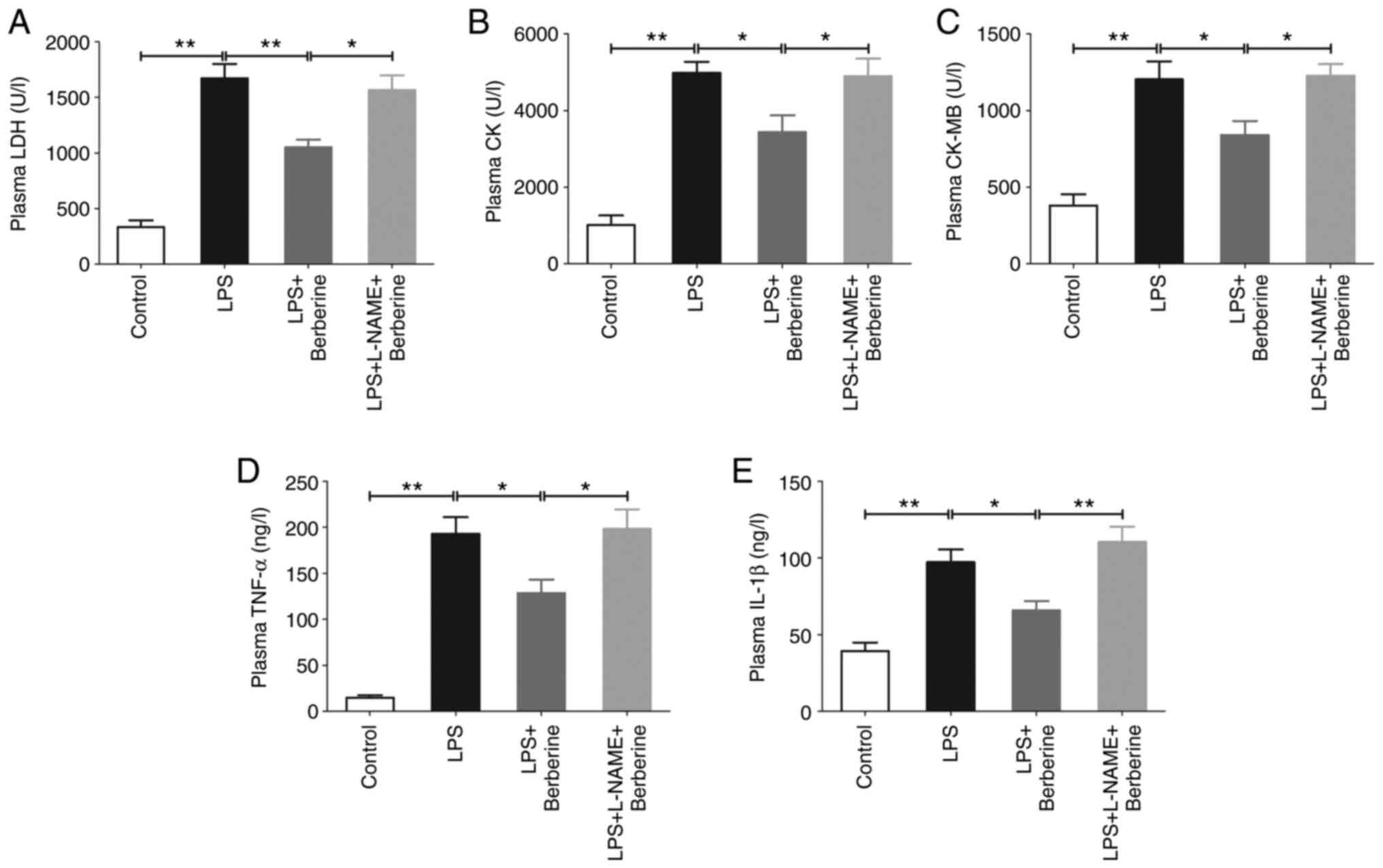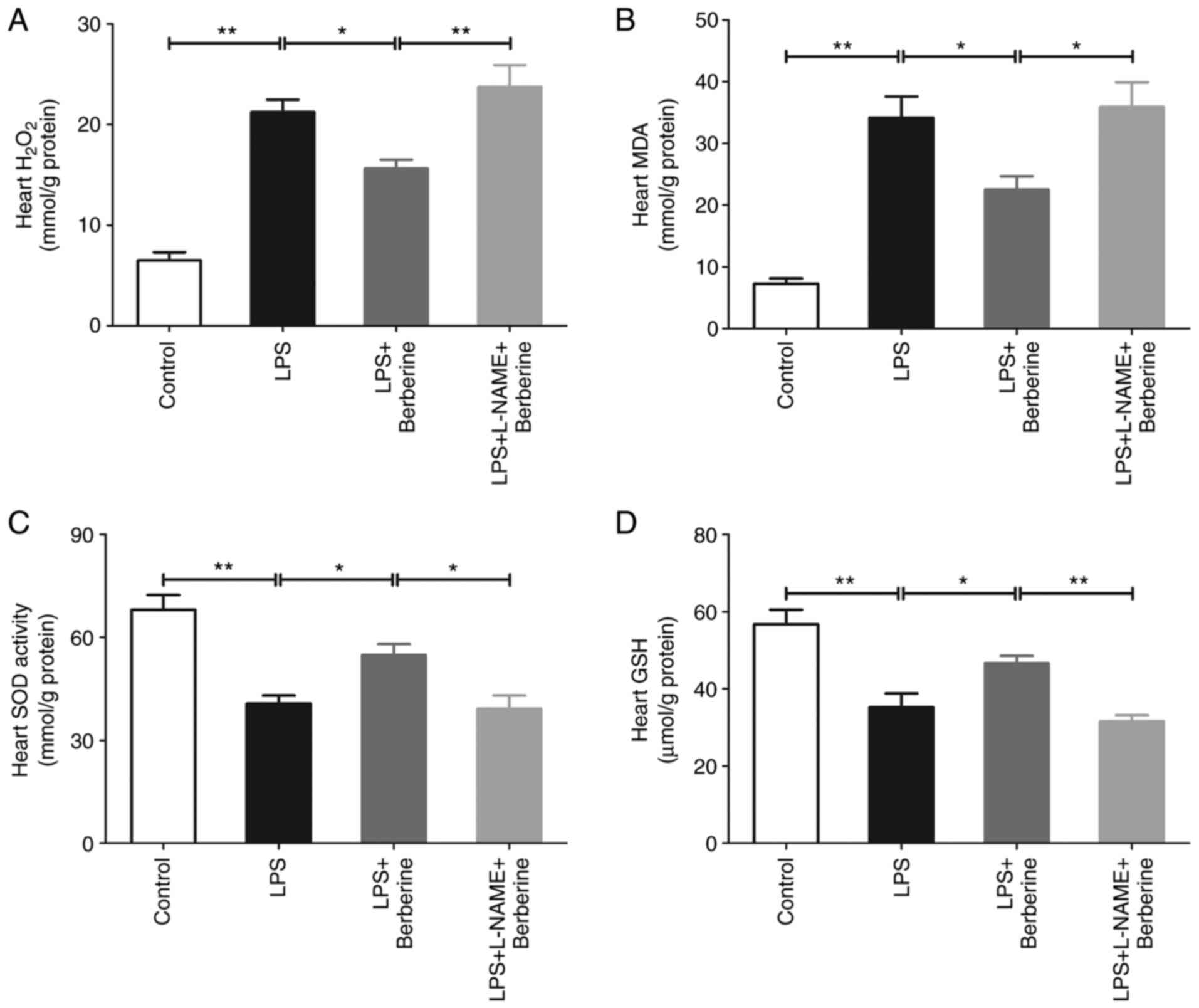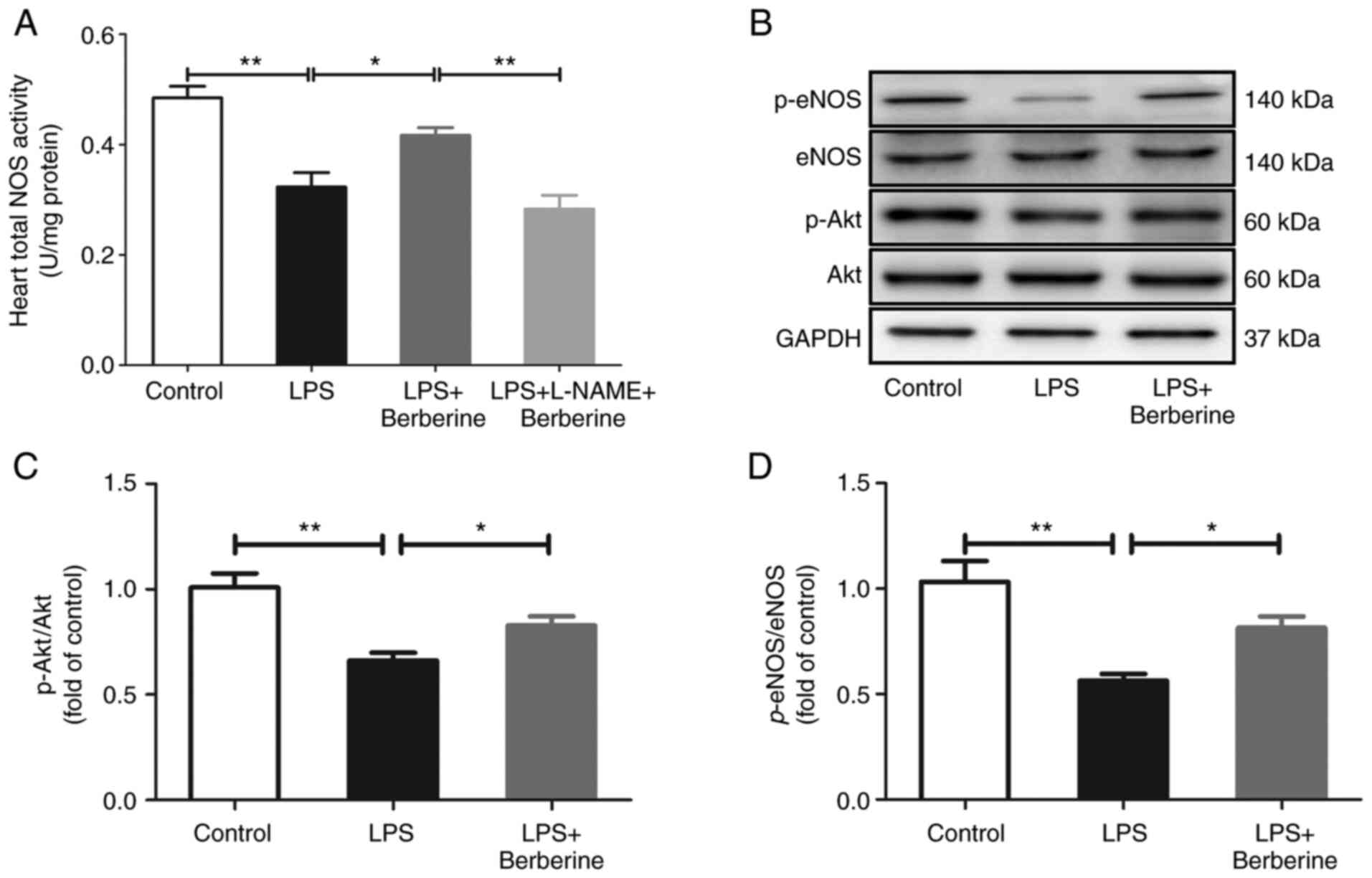|
1
|
Singer M, Deutschman CS, Seymour CW,
Shankar-Hari M, Annane D, Bauer M, Bellomo R, Bernard GR, Chiche
JD, Coopersmith CM, et al: The third international consensus
definitions for sepsis and septic shock (Sepsis-3). JAMA.
315:801–810. 2016.PubMed/NCBI View Article : Google Scholar
|
|
2
|
L'Heureux M, Sternberg M, Brath L,
Turlington J and Kashiouris MG: Sepsis-induced cardiomyopathy: A
comprehensive review. Curr Cardiol Rep. 22(35)2020.PubMed/NCBI View Article : Google Scholar
|
|
3
|
Wang J, Wang XT, Liu DW, Zhang HM and Su
LX: Induction and deduction in sepsis-induced cardiomyopathy: Five
typical categories. Chin Med J (Engl). 133:2205–2211.
2020.PubMed/NCBI View Article : Google Scholar
|
|
4
|
Landesberg G, Gilon D, Meroz Y, Georgieva
M, Levin PD, Goodman S, Avidan A, Beeri R, Weissman C, Jaffe AS and
Sprung CL: Diastolic dysfunction and mortality in severe sepsis and
septic shock. Eur Heart J. 33:895–903. 2012.PubMed/NCBI View Article : Google Scholar
|
|
5
|
Li N, Zhou H, Wu H, Wu Q, Duan M, Deng W
and Tang Q: STING-IRF3 contributes to lipopolysaccharide-induced
cardiac dysfunction, inflammation, apoptosis and pyroptosis by
activating NLRP3. Redox Biol. 24(101215)2019.PubMed/NCBI View Article : Google Scholar
|
|
6
|
Carrara M, Ferrario M, Bollen Pinto B and
Herpain A: The autonomic nervous system in septic shock and its
role as a future therapeutic target: A narrative review. Ann
Intensive Care. 11(80)2021.PubMed/NCBI View Article : Google Scholar
|
|
7
|
Winkler MS, Nierhaus A, Poppe A, Greiwe G,
Gräler MH and Daum G: Sphingosine-1-Phosphate: A potential
biomarker and therapeutic target for endothelial dysfunction and
sepsis? Shock. 47:666–672. 2017.PubMed/NCBI View Article : Google Scholar
|
|
8
|
Sun Y, Yao X, Zhang QJ, Zhu M, Liu ZP, Ci
B, Xie Y, Carlson D, Rothermel BA, Sun Y, et al: Beclin-1-dependent
autophagy protects the heart during sepsis. Circulation.
138:2247–2262. 2018.PubMed/NCBI View Article : Google Scholar
|
|
9
|
Sepúlveda M, Gonano LA, Viotti M, Morell
M, Blanco P, López Alarcón M, Peroba Ramos I, Bastos Carvalho A,
Medei E and Vila Petroff M: Calcium/calmodulin protein kinase
ii-dependent ryanodine receptor phosphorylation mediates cardiac
contractile dysfunction associated with sepsis. Crit Care Med.
45:e399–e408. 2017.PubMed/NCBI View Article : Google Scholar
|
|
10
|
Hollenberg SM and Singer M:
Pathophysiology of sepsis-induced cardiomyopathy. Nat Rev Cardiol.
18:424–434. 2021.PubMed/NCBI View Article : Google Scholar
|
|
11
|
Kawaguchi S, Okada M, Ijiri E, Koga D,
Watanabe T, Hayashi K, Kashiwagi Y, Fujita S and Hasebe N:
β3-Adrenergic receptor blockade reduces mortality in
endotoxin-induced heart failure by suppressing induced nitric oxide
synthase and saving cardiac metabolism. Am J Physiol Heart Circ
Physiol. 318:H283–H294. 2020.PubMed/NCBI View Article : Google Scholar
|
|
12
|
Farah C, Michel LYM and Balligand JL:
Nitric oxide signalling in cardiovascular health and disease. Nat
Rev Cardiol. 15:292–316. 2018.PubMed/NCBI View Article : Google Scholar
|
|
13
|
Ndongson-Dongmo B, Lang GP, Mece O,
Hechaichi N, Lajqi T, Hoyer D, Brodhun M, Heller R, Wetzker R,
Franz M, et al: Reduced ambient temperature exacerbates
SIRS-induced cardiac autonomic dysregulation and myocardial
dysfunction in mice. Basic Res Cardiol. 114(26)2019.PubMed/NCBI View Article : Google Scholar
|
|
14
|
Ndongson-Dongmo B, Heller R, Hoyer D,
Brodhun M, Bauer M, Winning J, Hirsch E, Wetzker R, Schlattmann P
and Bauer R: Phosphoinositide 3-kinase gamma controls
inflammation-induced myocardial depression via sequential cAMP and
iNOS signalling. Cardiovasc Res. 108:243–253. 2015.PubMed/NCBI View Article : Google Scholar
|
|
15
|
Zeng N, Xu J, Yao W, Li S, Ruan W and Xiao
F: Brain-derived neurotrophic factor attenuates septic myocardial
dysfunction via eNOS/NO pathway in rats. Oxid Med Cell Longev.
2017(1721434)2017.PubMed/NCBI View Article : Google Scholar
|
|
16
|
Cai Y, Xin Q, Lu J, Miao Y, Lin Q, Cong W
and Chen K: A new therapeutic candidate for cardiovascular
diseases: Berberine. Front Pharmacol. 12(631100)2021.PubMed/NCBI View Article : Google Scholar
|
|
17
|
Yang S, Li D, Yu Z, Li Y and Wu M:
Multi-pharmacology of berberine in atherosclerosis and metabolic
diseases: Potential contribution of gut microbiota. Front
Pharmacol. 12(709629)2021.PubMed/NCBI View Article : Google Scholar
|
|
18
|
Šudomová M, Berchová-Bímová K, Marzocco S,
Liskova A, Kubatka P and Hassan STS: Berberine in human oncogenic
herpesvirus infections and their linked cancers. Viruses.
13(1014)2021.PubMed/NCBI View Article : Google Scholar
|
|
19
|
Yuan C, Wu M, Xiao Q, Zhao W, Li H, Zhong
Y, Zhao M, Li C, Li Y and Yang X: Blocking Msr1 by berberine
alkaloids inhibits caspase-11-dependent coagulation in bacterial
sepsis. Signal Transduct Target Ther. 6(92)2021.PubMed/NCBI View Article : Google Scholar
|
|
20
|
Wang Y, Du P and Jiang D: Berberine
functions as a negative regulator in lipopolysaccharide-induced
sepsis by suppressing NF-κB and IL-6 mediated STAT3 activation.
Pathog Dis. 78(ftaa047)2020.PubMed/NCBI View Article : Google Scholar
|
|
21
|
He Y, Yuan X, Zuo H, Li X, Sun Y and Feng
A: Berberine induces ZIP14 expression and modulates zinc
redistribution to protect intestinal mucosal barrier during
polymicrobial sepsis. Life Sci. 233(116697)2019.PubMed/NCBI View Article : Google Scholar
|
|
22
|
Chen YH, Teng X, Hu ZJ, Tian DY, Jin S and
Wu YM: Hydrogen sulfide attenuated sepsis-induced myocardial
dysfunction through TLR4 pathway and endoplasmic reticulum stress.
Front Physiol. 12(653601)2021.PubMed/NCBI View Article : Google Scholar
|
|
23
|
Xu L, Zheng X, Wang Y, Fan Q, Zhang M, Li
R, Ye J, Wu X, Zhao W and Zhang Y: Berberine protects acute liver
failure in mice through inhibiting inflammation and
mitochondria-dependent apoptosis. Eur J Pharmacol. 819:161–168.
2018.PubMed/NCBI View Article : Google Scholar
|
|
24
|
Bülbül M and Sinen O: Dual autonomic
inhibitory action of central Apelin on gastric motor functions in
rats. Auton Neurosci. 212:17–22. 2018.PubMed/NCBI View Article : Google Scholar
|
|
25
|
Antonucci E, Fiaccadori E, Donadello K,
Taccone FS, Franchi F and Scolletta S: Myocardial depression in
sepsis: From pathogenesis to clinical manifestations and treatment.
J Crit Care. 29:500–511. 2014.PubMed/NCBI View Article : Google Scholar
|
|
26
|
Fan TT, Cheng BL, Fang XM, Chen YC and Su
F: Application of Chinese medicine in the management of critical
conditions: A review on sepsis. Am J Chin Med. 48:1315–1330.
2020.PubMed/NCBI View Article : Google Scholar
|
|
27
|
Li Y, Zhou J, Qiu J, Huang Z, Wang W, Wu P
and Feng A: Berberine reduces gut-vascular barrier permeability via
modulation of ApoM/S1P pathway in a model of polymicrobial sepsis.
Life Sci. 261(118460)2020.PubMed/NCBI View Article : Google Scholar
|
|
28
|
He Y, Yuan X, Zuo H, Sun Y and Feng A:
Berberine exerts a protective effect on Gut-vascular barrier via
the modulation of the Wnt/beta-catenin signaling pathway during
sepsis. Cell Physiol Biochem. 49:1342–1351. 2018.PubMed/NCBI View Article : Google Scholar
|
|
29
|
Mou SQ, Zhou ZY, Feng H, Zhang N, Lin Z,
Aiyasiding X, Li WJ, Ding W, Liao HH, Bian ZY and Tang QZ:
Liquiritin attenuates lipopolysaccharides-induced cardiomyocyte
injury via an AMP-Activated protein kinase-dependent signaling
pathway. Front Pharmacol. 12(648688)2021.PubMed/NCBI View Article : Google Scholar
|
|
30
|
Dai S, Ye B, Zhong L, Chen Y, Hong G, Zhao
G, Su L and Lu Z: GSDMD Mediates LPS-induced septic myocardial
dysfunction by regulating ROS-dependent NLRP3 inflammasome
activation. Front Cell Dev Biol. 9(779432)2021.PubMed/NCBI View Article : Google Scholar
|
|
31
|
Chen H, Liu Q, Liu X and Jin J: Berberine
attenuates septic cardiomyopathy by inhibiting TLR4/NF-κB
signalling in rats. Pharm Biol. 59:121–128. 2021.PubMed/NCBI View Article : Google Scholar
|
|
32
|
Liu Y, Yang W, Sun X, Xie L, Yang Y, Sang
M and Jiao R: SS31 ameliorates sepsis-induced heart injury by
inhibiting oxidative stress and inflammation. Inflammation.
42:2170–2180. 2019.PubMed/NCBI View Article : Google Scholar
|
|
33
|
Giustina AD, Bonfante S, Zarbato GF,
Danielski LG, Mathias K, de Oliveira AN Jr, Garbossa L, Cardoso T,
Fileti ME, De Carli RJ, et al: Dimethyl fumarate modulates
oxidative stress and inflammation in organs after sepsis in rats.
Inflammation. 41:315–327. 2018.PubMed/NCBI View Article : Google Scholar
|
|
34
|
Daiber A, Kröller-Schön S, Oelze M, Hahad
O, Li H, Schulz R, Steven S and Münzel T: Oxidative stress and
inflammation contribute to traffic noise-induced vascular and
cerebral dysfunction via uncoupling of nitric oxide synthases.
Redox Biol. 34(101506)2020.PubMed/NCBI View Article : Google Scholar
|
|
35
|
Ilari S, Dagostino C, Malafoglia V, Lauro
F, Giancotti LA, Spila A, Proietti S, Ventrice D, Rizzo M, Gliozzi
M, et al: protective effect of antioxidants in nitric Oxide/COX-2
interaction during inflammatory pain: The role of nitration.
Antioxidants (Basel). 9(1284)2020.PubMed/NCBI View Article : Google Scholar
|
|
36
|
Dal-Secco D, DalBó S, Lautherbach NES,
Gava FN, Celes MRN, Benedet PO, Souza AH, Akinaga J, Lima V, Silva
KP, et al: Cardiac hyporesponsiveness in severe sepsis is
associated with nitric oxide-dependent activation of G protein
receptor kinase. Am J Physiol Heart Circ Physiol. 313:H149–H163.
2017.PubMed/NCBI View Article : Google Scholar
|
|
37
|
López A, Lorente JA, Steingrub J, Bakker
J, McLuckie A, Willatts S, Brockway M, Anzueto A, Holzapfel L,
Breen D, et al: Multiple-center, randomized, placebo-controlled,
double-blind study of the nitric oxide synthase inhibitor 546C88:
Effect on survival in patients with septic shock. Crit Care Med.
32:21–30. 2004.PubMed/NCBI View Article : Google Scholar
|
|
38
|
Ichinose F, Buys ES, Neilan TG, Furutani
EM, Morgan JG, Jassal DS, Graveline AR, Searles RJ, Lim CC, Kaneki
M, et al: Cardiomyocyte-specific overexpression of nitric oxide
synthase 3 prevents myocardial dysfunction in murine models of
septic shock. Circ Res. 100:130–139. 2007.PubMed/NCBI View Article : Google Scholar
|
|
39
|
Wang Y, Huang Y, Lam KS, Li Y, Wong WT, Ye
H, Lau CW, Vanhoutte PM and Xu A: Berberine prevents
hyperglycemia-induced endothelial injury and enhances
vasodilatation via adenosine monophosphate-activated protein kinase
and endothelial nitric oxide synthase. Cardiovasc Res. 82:484–492.
2009.PubMed/NCBI View Article : Google Scholar
|
|
40
|
Kim HJ, Yoo HY, Jang JH, Lin HY, Seo EY,
Zhang YH and Kim SJ: Wall stretch and thromboxane A2
activate NO synthase (eNOS) in pulmonary arterial smooth muscle
cells via H2O2 and Akt-dependent
phosphorylation. Pflugers Arch. 468:705–716. 2016.PubMed/NCBI View Article : Google Scholar
|
|
41
|
Chen K, Li G, Geng F, Zhang Z, Li J, Yang
M, Dong L and Gao F: Berberine reduces ischemia/reperfusion-induced
myocardial apoptosis via activating AMPK and PI3K-Akt signaling in
diabetic rats. Apoptosis. 19:946–957. 2014.PubMed/NCBI View Article : Google Scholar
|
|
42
|
Xiao M, Men LN, Xu MG, Wang GB, Lv HT and
Liu C: Berberine protects endothelial progenitor cell from damage
of TNF-α via the PI3K/AKT/eNOS signaling pathway. Eur J Pharmacol.
743:11–16. 2014.PubMed/NCBI View Article : Google Scholar
|
|
43
|
Aremu OO, Oyedeji AO, Oyedeji OO,
Nkeh-Chungag BN and Rusike CRS: In vitro and in vivo antioxidant
properties of taraxacum officinale in
Nω-Nitro-l-Arginine Methyl ester (L-NAME)-induced
hypertensive rats. Antioxidants (Basel). 8(309)2019.PubMed/NCBI View Article : Google Scholar
|
|
44
|
Bougaki M, Searles RJ, Kida K, Yu J, Buys
ES and Ichinose F: Nos3 protects against systemic inflammation and
myocardial dysfunction in murine polymicrobial sepsis. Shock.
34:281–290. 2010.PubMed/NCBI View Article : Google Scholar
|


















